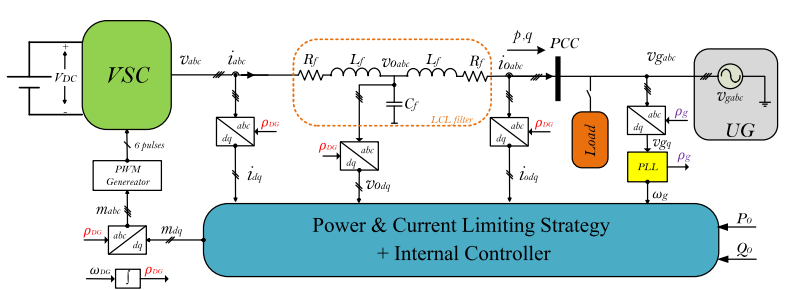Power and Current Limiting Strategy Based on Droop Controller with Floating Characteristic for Grid-Connected Distributed Generations
Objective
The main objective of this project is to improve the performance of grid connected distribution generations by employing power and current limiting strategy.
Abstract
This paper presents the power and current limiting of inverter-interfaced GCDCDGs under UG frequency and/or voltage magnitude drops. GCDCDG output power and current increase under the UG frequency drop, and if this increase exceeds the maximum of them, current limiters are saturated and according to P ∼ ω droop characteristic the GCDCDG frequency does not track the UG frequency, and this frequency difference leads to power oscillation between DG and UG and the system becomes unstable. In this paper, a new strategy based on the droop-control method is proposed to limit the output power and current of GCDCDGs without using a current limiter that realizes a stable operation under the mentioned conditions. In the proposed method instead of increasing the droop coefficients to limit P and Q at their constraints, the droop curves move down after powers and currents exceed maximum values, using two supplementary control signals. The performance of the proposed method is demonstrated with simulation results using MATLAB/Simulink.
Keywords: Distributed generation, droop controller, grid-connected, power and current limiting.
NOTE: Without the concern of our team, please don't submit to the college. This Abstract varies based on student requirements.
Block Diagram

Specifications
Software Configuration:
Operating System : Windows 7/8/10
Application Software : Matlab/Simulink
Hardware Configuration:
RAM : 8 GB
Processor : I3 / I5(Mostly prefer)
Learning Outcomes
- Introduction to Matlab/Simulink
- What is EISPACK & LINPACK
- How to start with MATLAB
- About Matlab language
- About tools & libraries
- Application of Matlab/Simulink
- About Matlab desktop
- Features of Matlab/Simulink
- Basics on Matlab/Simulink
- Introduction to controllers.
- Study of PWM techniques.
- Project Development Skills:
- Problem analyzing skills
- Problem solving skills
- Creativity and imaginary skills
- Programming skills
- Deployment
- Testing skills
- Debugging skills
- Project presentation skills
- Thesis writing skills


 Paper Publishing
Paper Publishing
